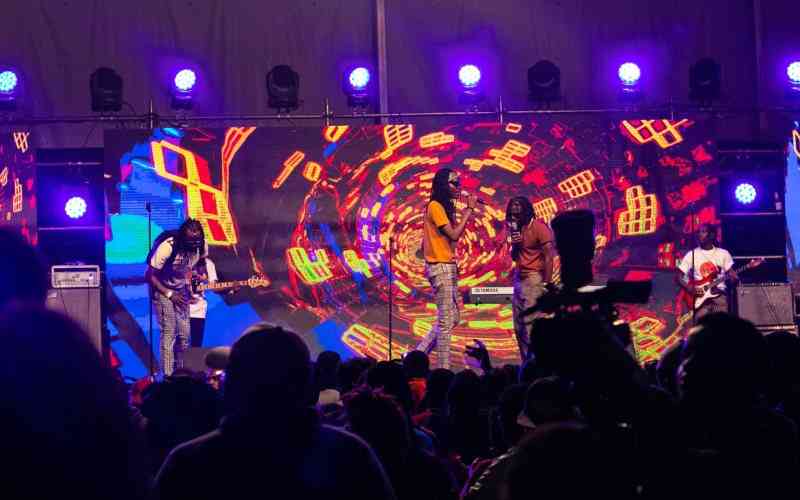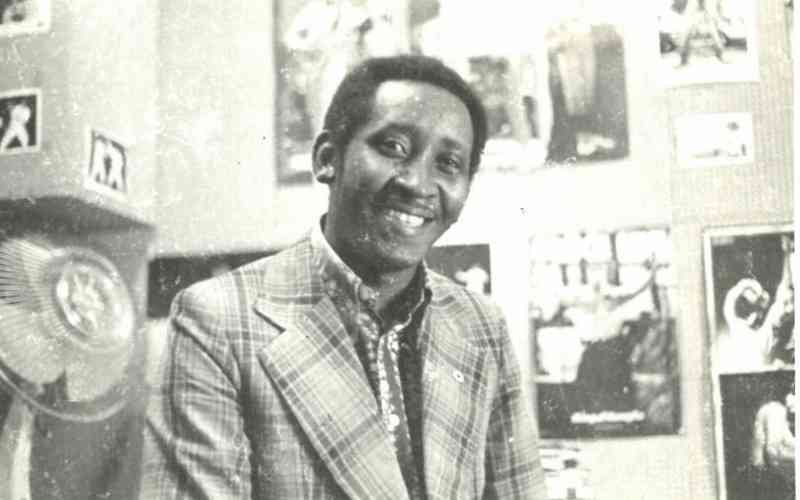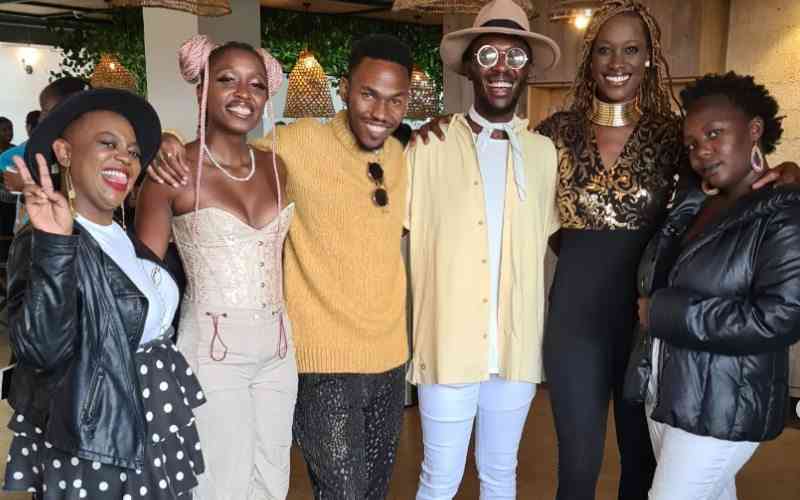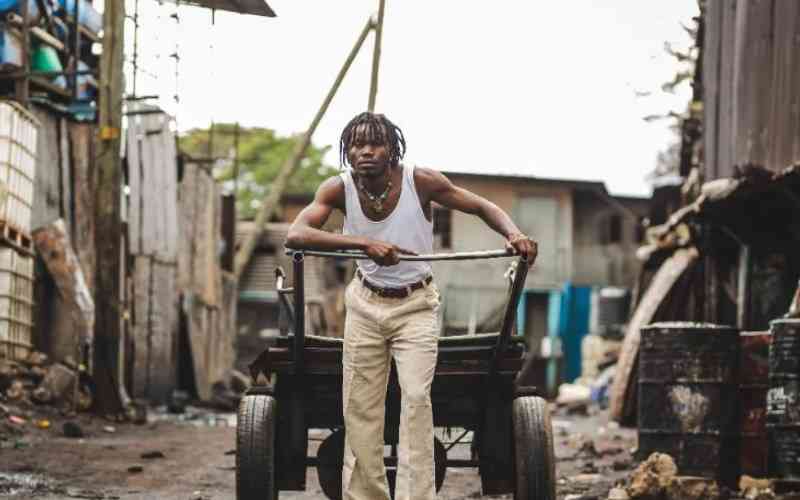
Two weeks ago, fans of afro-fusion and folk were treated to energetic performances from acts like Chief Matigari, Ayrosh, Ambasa Mandela, Kwame Rigii, and H_art the Band at the Folk Fusion event in Nairobi.
A week earlier, Brian Sigu had launched his new album titled 'APAKA' at Kuona Trust Collective Nairobi in a splendid event that had an impressive lineup.
Kenya's art and cultural spaces experienced a curious change with the turn of the first decade of the century in 2010.
A lot of people have attributed this to the major political event at the time; that is, the promulgation of the new constitution which not only brought with it favourable policies (and organs of enforcement) but also hope.
In the years that followed, the creation and consumption of art in the country boomed.
In music particularly, the country saw a boom in the consumption of traditional music, and the country was dominated at some points with events to celebrate local communities such as Mugithi nights, Ramogi nights, and cultural festivals.
Once when we got out of control and were overcome by this excitement and had a Naija night in Nairobi at some point.
Over the years, the rise in popularity of live music and live performance first in Nairobi and then later to other parts of the country, has also seen a rise in the consumption of alternative music and afro-fusion as an independent genre, and consequently, the rise of new faces in the music spaces.
Benga
Benga as a genre evolved around the 1950s and was first common among Luo musicians although it also borrowed from both Congolese Soukous and South Africa's Kwela music and a bit of the Cuban music.
The original Benga was created by infusing beats from instruments such as orutu, and nyatiti with drums, and its rhythm was slow and poetic making it easy for fans to get the message.
In the Contemporary Benga, the bass guitar has replaced nyatiti which was a major instrument in the early Benga rhythm.
Ketebul Music's research archives define Benga's distinctive features as its fast-paced rhythmic beat and bouncy finger-picking guitar technique.
While Benga has evolved hugely from the 'Ogara' years to 'Musa Juma' (who also played Rumba) years, there is an even more modern feel to the Benga being played today in the country.
Contemporary Benga artists in Kenya such as Winyo Shiphton still maintain the old playing style of Benga, except he has added a modern touch to it.
In an interview with Cycles Podcast, Winyo explains that he "composes, sings and performs contemporary Benga Music. I draw inspiration from the original Kenyan genre of Benga but then fuse in Jazz, traditional folk music, and RnB."
Winyo (whose name means 'Bird' in Luo) is not only known for his experimentation with different genres including fusing Benga with electronic beats (whose result, by the way, is bewilderingly astounding) but also for his great vocals.
Dan Aceda, whose second album 'Benganology' earned him the nickname 'Crown Prince of Benga' is also one of the contemporary Benga musicians in the country.
Other famous Benga artists include Ken Wa Maria, Alex Kasau Jeff Maithya (who all sing in Kamba) among many others.
Folk
While Folk music has many interpretations; music passed on orally from one generation to another, or that is played using traditional instruments, it is generally true that it is music that is associated with a people's culture and is about cultural or national identity.
Although Kenya has many folklore songs that were traditionally played and consumed by the different ethnic groups in the country, some of the early, nationally (and internationally) famous folk musicians we had as a country include the examples of Fadhili Williams (who composed 'Malaika'), Equator Sound Band (Pole Musa) and George Mukabi.

Because of its style of playing, Ohangla as a genre falls under folk music.
"The original Ohangla music was fast-paced, high-pitched, vulgar, and often accompanied by vigorous dancing or movement of the body. It was mostly ritualistic and was often accompanied by nyatiti, an 8-string instrument (almost similar to the Kamba Nane by the Kisii) that was played by plucking the strings," says Dan Onyango.
Ayub Ogada is considered one of the greatest composers of Folk music and his songs were known to have a natural feel to them which he achieved by having different sounds playing in the background such as songs of birds, the calls of animals, and the sounds of children playing.
Modern Nyatiti players include Makadem, Judith Bwire, and Olith Ratego (who also is Ja Timba - a carpenter, in Ugenya. Olith means a crow in Luo - and the young Nyatiti player Kent Mugenda Ja Siaya (pronounced as Siaya, not Siaya).
Contemporary Folk musicians include Brian Sigu (Sigu, ironically means 'enmity' in Luo although he's a super friendly person), who has managed to replace the traditional instruments with modern ones while still maintaining the original sounds.
Sigu has since released two albums 'Jambaka' and most recently, 'Apaka' which is a Luo word for waves (but apaka could also mean praises. Pako is to praise. Paka is a cat.)
The concept of the name, Brian says, is reflected in the overall theme of the album. 'The album addresses all the day-to-day life.... the waves of love, waves of dreams, the waves of diseases, the waves of famine... you name it," he explains. The 'waves' in the album are a metaphor for life's challenges.
Other musicians include Kwame Rigii and Ayrosh who in an earlier interview explained, "I rarely write or perform music in English because I am passionate about Mugithi jams. I have a lot of pride in knowing that I share the music of our people, and it makes me happy when I see my fans jamming and plugging into the vibe."
Rhumba
Rhumba or Rumba has been and is still very popular in Kenya, transcending not only age but also economic classes and ethnicity to bond Kenyans into an identity of lovers of Rumba.
The Rumba sound played in Kenya borrowed heavily from the Congolese Rumba sounds, but like any other genre, it has evolved in a significant way from the original sounds to what is played now.
Sauti Sol is currently one of the most famous, modern Rumba musicians in the country, with numerous Rumba hit songs including one titled, 'Rhumba' Japani in which another young, promising Rhumba musician- Okello Max- is also featured.
According to Simply Yaba, who plays a slightly different version of Rumba, "Rhumbacane is a fusion of Rhumba, Trap, and Benga with a touch of new school lyrics and melodies. It's my own thing- it's a combination of "Rhumba" plus "Cane" for sugarcane to mean sweet Rhumba."
Other new faces of Rhumba include Watendawili, Bensoul, Nviiri, and Wanavokali among many others.

Afro-fusion
Afro-fusion is a wide genre of music that is modern not only in the style of playing but also in the flexibility of language and of definition.
From afro-jazz, afro-soul, and afro-reggae to afro-house, this is a unique genre that involves a lot of experimenting and fusing of different genres of music styles.
"I actually cannot put music in a box," says Ambasa Mandela, the hitmaker of Ona 'Sasa', 'Kulundeng' among many other songs. "I'm a versatile musician and versatility is the key.
"We've got music as a universal language. So, at times [if] I feel like a message will be heard better through Reggae, I'll compose Reggae in my African rendition. So, in whatever genre I do, I africanise it to make it be back home."
According to Ayo Dee, another promising young musician, "My music genre is a rather new but not so new concept of music. It is a collection of different genres in one with a Kenyan authentic vibe. This is what I came up with since we consume different sounds as Kenyans and decided to call it AfroVibe music.
"It is a mixture of Urban sounds (Malocal/genge), Chakacha, Amapiano, Afrobeats, Rhumba, Reggae, and benga as a collection with a touch of soul music and African blues. The music has no specific style of play. However, its uniqueness is in the style of songwriting, rhythm, and flow that I put to it that then dictates how the music eventually sounds."
Afro-hip hop is also a fast-rising genre that is popular, especially among the urban crowds.
"My genre of Music is Afro-Luo. Using Sheng and Luo Languages in my Lyrics. My style has an urban vibe 'Sheng' Fused with Traditional Language that's Luo. I Believe it's Folk-Pop. The Genre is growing so first in a way that more artists are embracing the use of Luo Language in their lyrics. You know this acts as a bridge for people in urban areas all over the world to connect with their roots in an urban digestible way," says Micko Migra.
Other musicians include Coster Ojwang', Cheif Matigari (afro-reggae), and Kikos! which is a young band composed of about six musicians.

 The Standard Group Plc is a multi-media organization with investments in media
platforms spanning newspaper print
operations, television, radio broadcasting, digital and online services. The
Standard Group is recognized as a
leading multi-media house in Kenya with a key influence in matters of national and
international interest.
The Standard Group Plc is a multi-media organization with investments in media
platforms spanning newspaper print
operations, television, radio broadcasting, digital and online services. The
Standard Group is recognized as a
leading multi-media house in Kenya with a key influence in matters of national and
international interest.
